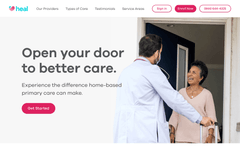Sublime
An inspiration engine for ideas
At the Veterans Health Administration, Ken Kizer, appointed by Bill Clinton in 1994, inherited an antiquated, inefficient health-care system. The VA faced changes in its client population, the competitive healthcare environment, and modalities for delivering care.2 In just five years, Kizer instituted an electronic medical record system, made struc
... See moreJeffrey Pfeffer • Power: Why Some People Have It—and Others Don't
Workplace Mental Health & Well-Being — Current Priorities of the U.S. Surgeon General
hhs.gov
Jay Parkinson • Toward a New Definition of Primary Care: Primary care 3.0
Over the past several years, in an attempt to make healthcare more efficient, various “process improvements” (excessive documentation, regulations, and a variety of other hoops and ladders) have replaced time spent with patients.
Tim Ferriss • The Almanack of Naval Ravikant: A Guide to Wealth and Happiness
Third and finally, it’s urgent that we go beyond utilitarian arguments to continue to stake moral claims for improving access to quality health care for all. Increased efficiency and lower costs, though important, are not the alpha and the omega of health care improvement, and they are still less of a factor in the improvement of health itself. The
... See moreRishi Manchanda • The Upstream Doctors: Medical Innovators Track Sickness to Its Source (Kindle Single) (TED Books)
Heal - Talk to a doctor on-demand and on your schedule
heal.com
As chronic disease came to replace communicable diseases atop the list of medicine’s priorities, realms of an individual’s life that had heretofore been considered private and therefore forbidden from physician inquiry, such as diet or marital relationships, came to be seen as important determinants of health.
Elizabeth Bradley • The American Health Care Paradox: Why Spending More is Getting Us Less
Mitch Katz directs the Los Angeles County Department of Health Services, the second-largest county health care system in the country. He described to me how economic incentives can stack up against upstream care. “Because there’s been little money toward prevention, there’s no payer or mechanism for prevention research like there is for medical res
... See more